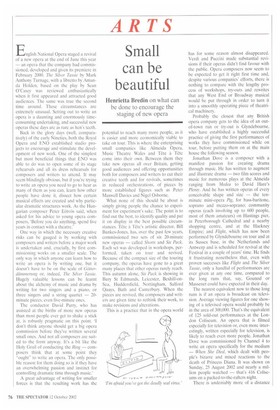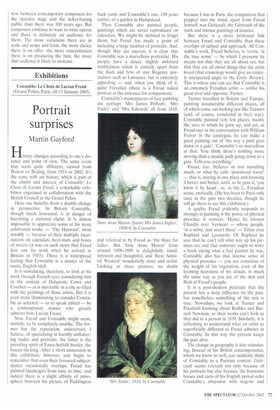Small can be beautiful
Henrietta Bredin on what can be done to encourage the staging of new opera English National Opera staged a revival of a new opera at the end of June this year an opera that the company had commissioned, developed and given its premiere in February 2000. The Silver Tassie by Mark Anthony Turnage, with a libretto by Amanda Holden, based on the play by Sean O'Cascy was reviewed enthusiastically when it first appeared and attracted good audiences. The same was true the second time around. These circumstances are extremely unusual. Setting out to write an opera is a daunting and enormously timeconsuming undertaking, and successful new operas these days are as rare as hen's teeth.
Back in the glory days (well, comparatively) of the early Nineties, both the Royal Opera and ENO established studio projects to encourage and stimulate the development of new work. One of the simplest but most beneficial things that ENO was able to do was to open some of its stage rehearsals and all its dress rehearsals for composers and writers to attend. It may seem blindingly obvious, but if you're trying to write an opera you need to go to hear as many of them as you can, learn how other people have done it, dissect how certain musical effects are created and why particular dramatic structures work. As the Hungarian composer Peter Ebtvos said, when asked for his advice to young opera composers, 'Before you do anything, spend five years in contact with a theatre.'
One way in which the necessary creative risks can be gauged is by working with composers and writers before a major work is undertaken and, crucially, by first commissioning works on a smaller scale. The only way in which anyone can learn how to write an opera is by writing one, but it doesn't have to be on the scale of Gi,itterdammerung or, indeed, The Silver lassie. Hugely valuable lessons can be learnt about the alchemy of music and drama by writing for two singers and a piano, or three singers and a string quartet — 20minute pieces, even five-minute ones.
The conductor David Parry, who has assisted at the births of more new operas than most people ever get to shake a stick at, is robustly pragmatic on this point. 'I don't think anyone should get a big opera commission before they've written several small ones. And not all composers are suited to the form anyway. It's a bit like the Holy Grail of conducting the Ring — composers think that at some point they "ought" to write an opera. The only possible reason for them doing so is if they have an overwhelming passion and instinct for controlling dramatic time through music.'
A great advantage of writing for smaller forces is that the resulting work has the potential to reach many more people, as it is easier and more economically viable to take on tour. This is where the enterprising small companies like Almeida Opera, Music Theatre Wales and Tete a Tete come into their own. Between them they take new operas all over Britain, getting good audiences and offering opportunities both for composers and writers to cut their creative teeth and for revivals, sometimes in reduced orchestrations, of pieces by more established figures such as Peter Maxwell Davies and Nigel Osborne.
What none of this should be about is simply giving people the chance to experiment for experiment's sake. The point is to find out the best, to identify quality and put it on display in the best possible circumstances. Tete a Tete's artistic director, Bill Bankes-Jones, has, over the past few years, commissioned two sets of six 20-minute new operas — called Shorts and Six Pack. Each set was developed in workshops, performed, taken on tour and revived. Because of the compact size of the touring company, the operas have gone to a great many places that other operas rarely reach. This autumn alone, Six Pack is showing in Bury St Edmunds, Leicester, Bexhill-onSea, Huddersfield, Nottingham, Salford Quays, Bath and Canterbury. When the pieces are revived, the composers and writers are given time to rethink their work, to make revisions and alterations.
This is a practice that in the opera world has for some reason almost disappeared. Verdi and Puccini made substantial revisions if their operas didn't find favour with the public. Opera composers now seem to be expected to get it right first time and, despite various companies' efforts, there is nothing to compare with the lengthy process of workshops, try-outs and rewrites that any West End or Broadway musical would be put through in order to turn it into a smoothly operating piece of theatrical machinery.
Probably the closest that any British opera company gets to the idea of an outof-town run or try-out is Glyndebourne, who have established a highly successful practice of giving the first performances of works they have commissioned while on tour, before putting them on at the main house the following season.
Jonathan Dove is a composer with a manifest passion for creating drama through music. He has written to augment and illustrate drama — two film scores and music for numerous plays at the Almeida ranging from Medea to David Hare's Plenty. And he has written operas of every conceivable shape and size — the tenminute mini-opera Pig, for bass-baritone, soprano and mezzo-soprano; community operas (each involving up to 600 people, most of them amateurs) on Hastings pier, in Peterborough Cathedral and a nearby shopping centre, and at the Hackney Empire; and Flight, which has now been performed by Glyndebourne on tour and at its Sussex base, in the Netherlands and Antwerp and is scheduled for revival at the Festival in a couple of years' time. He finds it frustrating nonetheless that, even with proven successes like Flight and The Silver Tassie, only a handful of performances are ever given at any one time, compared to the long runs that, say, Gounod or Massenet could have expected in their day.
The nearest equivalent now to those long runs is if an opera is broadcast on television. Average viewing figures for one showing of a televised opera would probably be in the area of 300,000. That's the equivalent of 125 sold-out performances at the London Coliseum. An opera that is filmed especially for television or, even more interestingly, written especially for television, is likely to reach even more people. Jonathan Dove was commissioned by Channel 4 to write an opera specifically for the medium — When She Died, which dealt with people's bizarre and mixed reactions to the death of Princess Diana. It was shown on Sunday. 25 August 2002 and nearly a million people watched — that's 416 Coliseums on a packed-to-the-rafters night.
There is undeniably more of a distance now between contemporary composers for the operatic stage and the ticket-buying public than there was 100 years ago. But composers continue to want to write operas and there is definitely an audience for them. The more variations there are in scale and scope and form, the more choice there is on offer, the more concentration there is on producing the best, the more that audience is likely to increase.



































































































 Previous page
Previous page